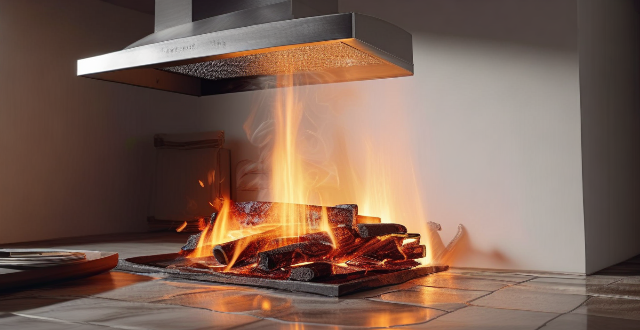To prevent kitchen fires, essential safety measures include keeping flammable materials away from heat sources, cleaning up spills immediately, not leaving cooking unattended, installing working smoke alarms, and having a fire extinguisher accessible. Cooking safety tips involve using appropriate cookware, watching pot lids, avoiding overfilling pots with oil, and setting timers for cooking. Electrical appliance safety requires unplugging unused appliances, inspecting cords regularly, and avoiding damaged plugs or outlets. Gas stove safety includes checking for gas leaks, keeping flammable objects away from burners, and having gas lines professionally inspected annually. Maintenance and cleanliness are also crucial, such as cleaning range hood filters, ovens, and disposing of grease properly.

Safety Precautions in Kitchens to Avoid Fires
Kitchen fires can be devastating, causing damage to property and potentially harming individuals. To prevent such incidents, it is crucial to follow safety precautions. Here are some essential measures you should take in the kitchen to avoid fires:
General Safety Measures
- Keep Flammable Materials Away from Heat Sources: Ensure that towels, paper, and plastic containers are kept away from stovetops and other heat sources.
- Clean Up Spills Immediately: Grease or oil spills can easily ignite, so clean them up as soon as possible.
- Do Not Leave Cooking Unattended: Stay in the kitchen while cooking, especially when using high heat or frying foods.
- Have Working Smoke Alarms Installed: Make sure there are functional smoke alarms near the kitchen to alert you of any fires.
- Have a Fire Extinguisher Accessible: Keep a multipurpose fire extinguisher within reach for emergencies.
Cooking Safety Tips
- Use Proper Cookware: Use pots and pans suitable for your stove type, whether electric or gas.
- Watch Your Cookware Lids: When boiling liquids, keep the lids open to prevent spillovers and potential fire hazards.
- Avoid Overfilling Pots with Oil: This can lead to grease fires if the oil overheats and ignites.
- Use Timers for Cooking: Set timers as reminders to check on food, reducing the risk of overcooking and potential fires.
Electrical Appliance Safety
- Unplug Appliances When Not in Use: This includes toasters, coffee makers, and other electrical appliances.
- Inspect Cords Regularly: Check for frayed or damaged cords on appliances and replace them if necessary.
- Avoid Using Damaged Plugs or Outlets: Do not force plugs into outlets, and have any damaged outlets repaired by a professional.
Gas Stove Safety
- Check for Gas Leaks: If you smell gas, turn off the stove immediately and ventilate the area before contacting a professional.
- Keep Flammable Objects Away from Burners: Make sure potholders, paper, and other combustible items are not near an open flame.
- Have a Professional Inspect Your Gas Lines Annually: This helps ensure that there are no leaks or issues with your gas supply.
Maintenance and Cleanliness
- Clean Range Hood Filters: Dirty filters can trap grease and increase the risk of fire.
- Clean Oven Regularly: Remove built-up grease and food residue inside the oven to prevent fires.
- Dispose of Grease Properly: Do not pour grease down the drain; instead, let it cool and dispose of it in the trash.
By following these safety precautions, you can significantly reduce the risk of fires in your kitchen. Remember, prevention is key, and being proactive about safety can save lives and property.